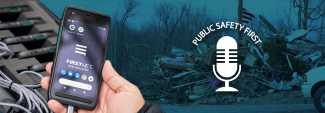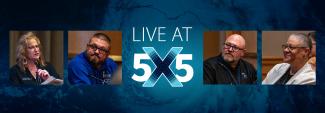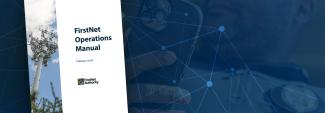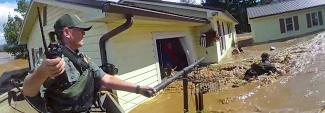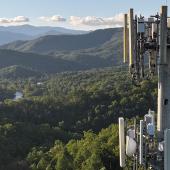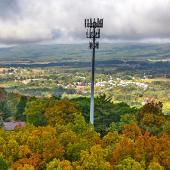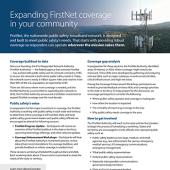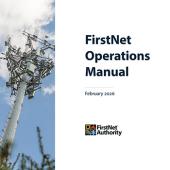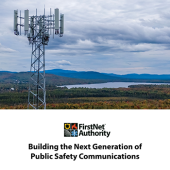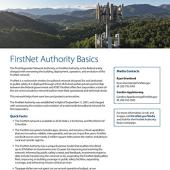Summary
In the latest episode of Public Safety First, host Dave Buchanan sits down with a FirstNet ‘Founding Father,’ and former PSAC chair, Chief Harlin McEwen to discuss the early days of FirstNet.
Guest
Dave Buchanan
FirstNet Authority Executive Director of Public Safety Advocacy
Harlin McEwen
Former FirstNet Authority Public Safety Advisory Committee Chair
Transcript
Preview
Narrator: You're listening to Public Safety First – a podcast to help you learn about the First Responder Network Authority and how you can be part of the future of public safety technology. And now, your host, Dave Buchanan.
Narrator: You're listening to Public Safety First – a podcast to help you learn about the First Responder Network Authority and how you can be part of the future of public safety technology. And now, your host, Dave Buchanan.
Dave Buchanan: Welcome to the Public Safety First podcast. Today, I’m delighted to welcome Chief Harlin McEwen to our podcast. We–Harlin and I are going to have a conversation about his history in public safety, his history with the early days of FirstNet, and hear some of his observations about where we’re going and what he’s most excited about. For those of you that haven’t yet met Harlin McEwen, he was our first chair of our first Public Safety Advisory Committee (PSAC) at FirstNet. He had a distinguished law enforcement career at local and federal levels, and most recently retired as our chair of the PSAC, where he spent the first three years at FirstNet as the Chair of our Public Safety Advisory Committee. Harlin, welcome to the podcast.
Harlin McEwen: Thank you!
Dave Buchanan: I’d like to start off by having the listeners learn a little bit more about your career and how you got involved in policing, and if you could just take a few minutes to talk about your early days as a police officer and all the way through to where you are today.
Harlin McEwen: It’s pretty hard in, in a few minutes to talk about 60 years of [chuckles] of experience, but it started because I had a next-door neighbor who was a local fire chief, and he had this mobile radio in his personal car, which he let me ride with him sometimes to the fire alarms, and that was where I got interested in public safety communications. That was long before there were any portable radios or anything. So, that’s got me interested in getting involved as an interested fire person. The police station was in the same building as the fire department and eventually they asked me if I wanted to be a part-time dispatcher, and that led me to eventually getting an offer to be a police officer, and that’s how it all started so, but it was always communications focused. I’ve been involved in many aspects, but if you think about the radio-aspect of it, I’ve watched the technology go from tube radios to transistors to you know, modern kinds of communications, and now of course, looking at where we are with broadband – it’s been quite an evolution, so to speak.
Dave Buchanan: Talk a little bit about your work outside of your day-to-day policing job. Once you got sort of more involved with the IACP and this, sort of this, national discussion of public safety communications, how did that come about? How did you grow into that leadership position?
Harlin McEwen: Well, first of all, because I had this radio focus and most people didn’t – didn’t have –I had a, you know, somewhat of a knowledge of the technology as it was evolving. I first became the Chairman of the – I got involved at the state level and national level when I became a police chief in 1972. So, I became the chairman of the New York State Police Chiefs Communications Committee and that led me to being appointed Chairman of the International Association of Chiefs of Police Communications Committee, and that was in 1978, And over those years, I was the leader – subject matter expert, so to speak – in law enforcement, to some extent, in public safety, on evolving communications technologies, watching these transition from simple push-to-talk kinds of things into more sophisticated data sharing. The issue is that during those years, the technology, you know, changed dramatically and over a period of time, what happened is, that I grew with that technology. I became very knowledgeable and conversant. I was never an engineer, but I understood how it worked and how it could benefit law enforcement and public safety, and that’s kind of how that all evolved. It made it necessary for me to be what I would call, a lead advocate for increasing radio spectrum that the FCC administered, so that’s kinda the kinds of things that I was involved with getting additional radio spectrum – that’s how the beginning of FirstNet started, was that we were advocating to Congress and to the FCC that instead of just narrow-band voice radio systems, we needed wide-band data systems, and in those days we were talking about wide-band, which was quite different, and we didn’t even know about broadband. So, that’s kind of how that all evolved. So I was ready and engaged in all of that transition, long before, you know, anybody really understood broadband.
Dave Buchanan: So, we’ve talked on previous podcasts about some of the early history of FirstNet – obviously, everyone’s well aware of the 911 Commission Report – and you were right at the center of the discussion in Washington, in Congress, with Executive Branch. Talk a little bit about what that was like and your experience, and what were your expectations for – we didn’t know it was going to be called FirstNet back then – but what were your expectations for what this public safety broadband network was going to be and what was that like?
Harlin McEwen: Well, first of all, during those years, we developed a – and you know I was involved critically in a leadership role in changing our attitude towards communications – and the thing of it is, that we always were advocates for strong, local licensing, and licensing, you know, and control. So, every police department, every fire department, everybody had their own licenses. There were thousands of them. So, in one county, if you had several fire departments and police departments and ambulance service, and so on, they all had their own frequencies and they weren’t interoperable. So we began talking about trying to improve interoperability. In those days, we were looking at P25 as a standard. That eventually led to the fact that we needed perhaps a different approach. We realized eventually we’re never going to have true interoperability with all those different systems, ‘cause they were never funded at the same time, they were never in sync with the same technologies, and trying to get all those thousands of different systems in sync into an interoperable way was just never going to happen. So, that’s when we began to think about a nationwide approach for data. In other words, we were looking at ‘how do we get data differently than we do push-to-talk voice’ and that’s when we started to develop the strategy for what eventually became FirstNet.
Dave Buchanan: So your career spanned, in law enforcement, you were involved in state association, the national association, International Association Chiefs of Police, what was it like working across disciplines with the fire community? Did that go well at first? Obviously, it came nicely by the time the Act was passed, and that’s one of the, I think, hallmarks of the success of that was first responders coming together. What was that like in the beginning? Did you –
Harlin McEwen: Well, I mean, because I’ve been in the business so long and I was a volunteer fireman for a period of years, so I had some respect for the fire service, a little differently than most law enforcement people. The working relationship between police and fire varied all over the country. It was in some places it was really good. Some places it was just terrible. And it always boils down to personality, people. If people want to work together with each other and respect each other’s opinions and try to come up with compromising solutions, that works good. But, in this whole arena, I would say that when we started advocating for this nationwide public safety broadband concept, the public safety community came together in a way that we had never seen before. The police, and the fire, and EMS community – all of those people began to realize that if we didn’t work together, we would never be successful. And of course that led to our eventually forming partnerships with the local and state government associations, like the Conference of Mayors, the National Governors, the League of Cities, Association of Counties, all those organizations that represented state and local government, if we hadn’t partnered with them, we wouldn’t have been successful. But eventually, we all came together and that’s what really made it happen.
Dave Buchanan: So let’s jump ahead to 2012, the climate was right, the law was passed, FirstNet became a reality – you were involved from the very beginning with the early leadership team and the board was ultimately named, and you were named the first Chair of the Public Safety Advisory Committee, talk a little bit about those, you know, first months were like in the early days, before there were even staff – what that was like.
Harlin McEwen: Well it wasn’t easy, I have to tell you. It was a difficult thing. I mean, first of all, as you know, the law says there has to be a PSAC. The Public Safety Advisory Committee was not something that somebody just thought up – it was in the law and it said that the FirstNet Board had to consult with – there had to be a PSAC, it didn’t say what the PSAC was going to consist of. Actually, it could’ve been one or two people, but luckily, I’d been engaged in these kinds of discussions and the first Chairman of the Board, Sam Ginn reached out to me and offered me the opportunity to be appointed as the first Chairman, and one of the tasks that he gave to me was to develop a strategy for what the PSAC should consist of: who should be members of the PSAC, how many people, how should it operate, what should the governance be? And so, that’s what we, you know, I spent my time with a few key people. After I was appointed, the next thing was to appoint the four other people who were the Vice Chairs and were the – made up the Executive Committee. And then, that led to the eventual development of the membership of the PSAC and how were they appointed and all that. So, there was a, there was a, you know, a kind of a transition. It took a while to do it, but it ended up, I think, quite successful.
Dave Buchanan: So we had a podcast earlier, a month of two ago, with the existing leadership team of the PSAC. We had a great conversation about where we’re going with the PSAC into 2019 and beyond. Talk a little bit more Harlin about – and you’ve been now retired since 2017 as the Chair – but talk a little bit more about some of the early work that the PSAC did. You and I had a conversation earlier today about how important that was to the, really the foundation of what became FirstNet. A lot of the work that the PSAC was responsible for, found its way into either state plans, or into the RFP, or ultimately the contract with AT&T, but talk a little bit about what that was like, and some of those issues, and reflect on that, if you would.
Harlin McEwen: So working with the FirstNet Authority staff – the leadership, you and many others who were in various leadership roles – we were given tasks to perform and I was involved in the discussions leading up to what those tasks would be and which ones were more important than others, which one we’d do first, and so on. There were a number of those tasks. We had to deal with Identify Management (ICAM), we dealt with local control, we dealt with who will be eligible for access to FirstNet, many, many different topics. And we spent, most cases at least 6 months on each of those, maybe in some cases a little more, but working with – actually while we were doing those projects, staff were being additionally hired. For instance, the technical staff in Boulder were being hired on as we were doing some of those tasks. We brought some of them on board to help us with technical expertise. We would provide the public safety understanding, and they would give us the technical expertise and say, ‘Well, here’s what practical. Here’s how you can maybe accomplish what you want to accomplish, in a technical way that’s reasonable and affordable.’ So, those were the kinds of things we did. So, there were a whole lot of series of those tasks that we performed.
Dave Buchanan: Well, we’re grateful of the work PSAC did, and know that the content that came from that work really, as I mentioned, contributed in a tremendous way to the RFP and ultimately, the solution we see today. So, let’s talk now a little bit more about the FirstNet solution. What do you see as the, you know, some of the most important attributes about the solution? What excites you most about what we’re doing and what the network’s bringing to first responders?
Harlin McEwen: Well, first of all, the driving, the driving force behind this was that the other commercial networks, all of them, refused to give public safety any priority over their networks when we needed it the most. In other words, any time a major event occurred and the public was all competing for access to the network, we were just another customer. I wasn’t any different than my grandson, or my granddaughter, or my wife, or my aunt, or uncle. So, it just didn’t make any difference. So we could be dealing with a life and death situation, while they could be talking about what they’re going to have for lunch, and you know, something not that important. So, priority and preemption were probably the two driving forces behind this – not the only forces, but the driving forces, which we now have with Band-14 and the rules that are put in place. Then, the next thing was to develop what can we do in using a single, nationwide public safety network that we couldn’t do with just using commercial networks. We could develop special applications that aren’t available to the public – that we don’t want available to the public – that give us the tools to be able to protect public, you know, safety people, property, lives, and all of those things. And that’s what’s now being developed. I mean, I’m real excited about those kinds of things.
Dave Buchanan: So our work isn’t done, obviously. It’s a 25-year contract, we’re just a year into it. I think AT&T is doing a fantastic job with where we are here in 2018, but what challenges do you see, Harlin, that we’re going to be confronted with – what are you concerned about when you think about the future of FirstNet?
Harlin McEwen: Well, first of all, you always have to understand the financial aspects of anything. So, the fact that we were able to get 7 billion dollars of money that didn’t come out of the taxpayers – it came from spectrum auctions – was a critical first step in being able to develop the strategy for the next 25 years where we have a contract with AT&T. The fact that we’re now looking at, under the contract, the reinvestment opportunities and the future and how we can best build out this network and make it really a true public safety experience, different than any other commercial network can or will ever provide, is very important. And I think knowing what the FirstNet Authority is doing now in planning that strategic plan for the future is critical. And I know that public safety and the Public Safety Advisory Committee are going to be consulted, you know, regularly in this development, so that’s really important.
Dave Buchanan: Well, I’m glad we’ve had the chance to spend the day together. You’ve been a great resource to FirstNet. You’ve been a great resource to the development of this network. I consider you one of the Founding Fathers of FirstNet, and I think we’re lucky to have you here today, and really grateful for your time, your advice, and your council to us. Thank you for joining our podcast and I hope you can join us again.
Harlin McEwen: Thanks a lot!
Narrator: Thanks for listening today. We're excited to have you join our podcast community. Make sure to subscribe on iTunes, SoundCloud, and YouTube. You can learn more about the First Responder Network Authority at FirstNet.gov and learn about FirstNet products and services at FirsNet.com



